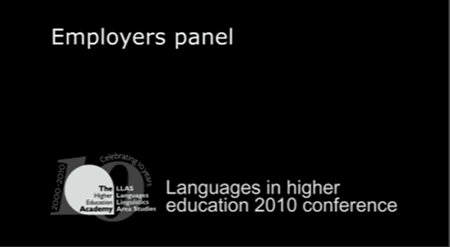The most recent videos appear at the top of this list.
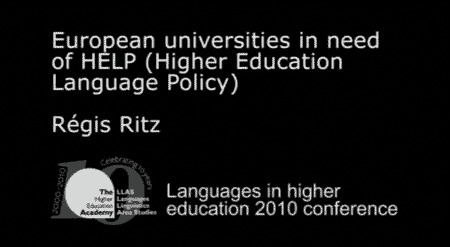
Keynote: Régis Ritz - European universities in need of HELP (Higher Education Language Policy)
Member of the pool of experts for the IEP (Institutional Evaluation Programme) run by EUA; chair/member of evaluation committees (since 2004) for the European Thematic Network Programme in the area of Languages and the MOLAN Programme - Network for the exchange of information about good practices that serve to motivate language learners; both programmes run by CEL/ELC.
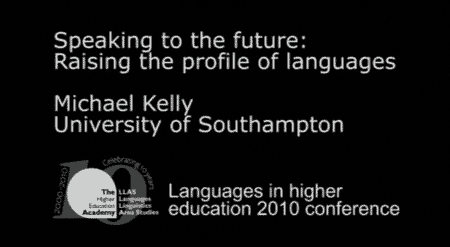
Keynote: Michael Kelly - Speaking to the future: raising the profile of languages in the UK
Director of the Subject Centre
- Oversees the strategic direction of the Subject Centre, Routes into Languages and Links into Languages
- Represents the Subject Centre and negotiates on its behalf
- Teacher and researcher in French cultural studies and European language education
- Read Mike's full biography
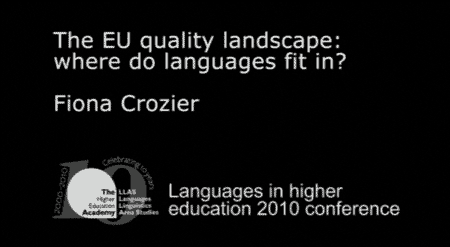
Keynote: Fiona Crozier - The EU quality landscape: where do languages fit in?
The Vice President of the European Association of Quality Assurance Agencies (ENQA) and Assistant Director in the Development & Enhancement Group at the Quality Assurance Agency for Higher Education (QAA), UK
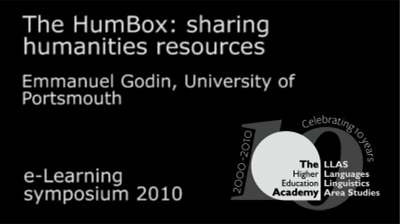
The HumBox: sharing humanities resources
The HumBox is a new way of storing, managing and publishing your Humanities teaching resources on the web. Share handouts, exercises, podcasts, videos and anything else you can imagine!
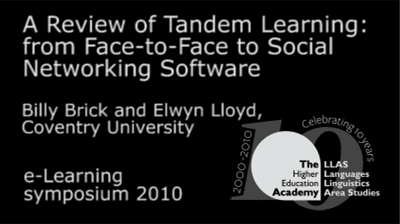
A review of tandem learning: from face-to-face to social networking software
Tandem learning has a long tradition in language learning in the form of pen-pals to practise written skills, and ‘language exchange’ in the form of face-to-face spoken interaction, where native or competent non-native speakers are available for informal oral practice outside the classroom. Such activities give language learning a more immediate purpose and help to motivate and stimulate learners. The advent of the internet led to traditional ‘penpalling’ being superseded by keypalling projects, whereby learners can link up with other speakers of the target language across the globe and correspond more frequently and much more conveniently. More recent technological developments have allowed for more sophisticated media-rich web-based software to be developed, such as social networking software and virtual worlds where individuals are able to set up profiles and seek partners to exchange language skills, not only in the written mode. This presentation will review some of the issues inherent in the different approaches to language exchange and peer-to-peer teaching, and will consider the effectiveness of Web 2.0 technology for facilitating tandem learning.
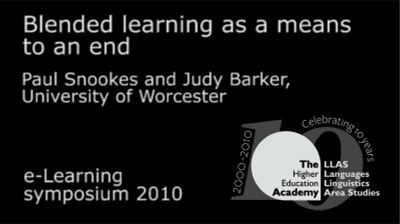
Blended learning as a means to an end
In this presentation you will learn about how the Language Centre in the University of Worcester, in collaboration with other HE and FE educational institutions, has delivered two innovative pilot blended modern foreign language courses using Wimba Classroom and Voice embedded in Moodle. This project was designed to explore the issues involved in helping those language learners who frequently find it difficult to enrol on modern foreign language courses. Namely, those who live outside of large conurbations where lesser taught or popular advanced level face-to-face modern foreign language courses are often unavailable due to lack of demand.
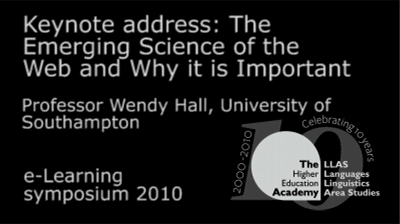
Keynote: The Emerging Science of the Web and Why it is Important
With the advent of the internet and the World Wide Web we are able to share information as never before. The Web has become a critical global infrastructure. Since its emergence in the mid-1990s, it has exploded into hundreds of billions of pages that touch almost all aspects of modern life. Today the jobs of more and more people depend on the Web. Media, banking and health care are being revolutionized by it, and governments are even considering how to run their countries with it. Little appreciated, however, is the fact that the Web is more than the sum of its pages and it is more than its technical protocols. Vast emergent properties have arisen that are transforming society. E-mail led to instant messaging, which on the Web has led to social networks such as Facebook and Twitter. The transfer of documents led to file-sharing sites such as Napster, which have led to user-generated portals such as blogs, Flickr and YouTube. Web 2.0, tagging content with labels, is creating online communities that share everything from concert news to health care. Looking forward we are adding to the Web of documents by creating a Web of linked data. It is our hypothesis that this will become the dominant data sharing and integration platform and that its effect on the world will be as profound and unexpected as the impact of the first Web. As we seek to understand the origins of the Web, appreciate its current state and anticipate possible futures there is a need to address the critical questions that will determine how the Web evolves as both a social and a technical network. The emerging field of understanding these issues is becoming known as Web Science. In this talk we will explore how this new science of the Web has become established, the insights that are beginning to emerge and discuss the major research and education challenges ahead.
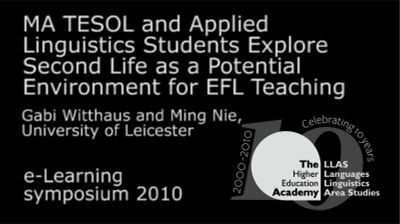
MA TESOL and Applied Linguistics Students Explore Second Life as a Potential Environment for EFL Teaching
This paper reports on an experiment being conducted in the University of Leicester’s online MA in TESOL and Applied Linguistics programme, in which volunteer students are participating in a series of visits to Second Life (SL). The primary aim is for students to experience the use of a virtual world for language teaching, and to draw conclusions about the value that such an environment might add for EFL teaching in their own contexts. A further aim is to address the students’ expressed desire for more interaction with their peers, and for greater variety in teaching approaches on the programme. Eighteen volunteers, located in almost as many countries, and spanning all modules on the MA, were recruited. The experiment is being carried out over a six-week period, and involves a series of structured “e-tivities” following Salmon’s (2002) five-stage model. Participants have introduced themselves on the Blackboard discussion forum and discussed their motivation for volunteering. They have also participated in inworld training sessions to learn basic technical and communication skills. Next, they will observe classes at an EFL school in SL. The observations will be followed by discussions both in Blackboard and inworld, in which students exchange views on the experience. Throughout the process, participants will be given technical support. Finally, students will be asked for their views on the use of SL as an EFL teaching environment. Findings will be reported in the presentation. This experiment is being conducted as part of the JISC-sponsored DUCKLING (Delivering University Curricula: Knowledge INnovation Gains) project at Leicester. In addition to the findings about enhancing curriculum delivery, the project will generate a range of SL training materials and guidelines to be published as open educational resources under the auspices of the JISC- and HEA-funded OTTER (Open, Transferable, Technically Enabled Educational Resources) project at Leicester. Bibliography Salmon, G. (2002) E-tivities: The Key to On-Line Learning. London and New York: Routledge.
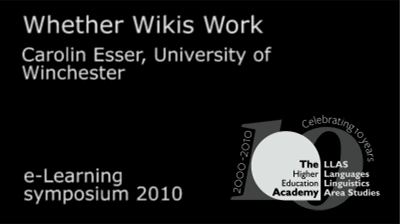
Whether Wikis Work: Student and Tutor Experiences in Using the wiki as a non-linear form of assessment
This presentation introduces a study into the use of wikis as a non-linear form of assessment in two Humanities modules at the University of Winchester. It was funded by the University Learning and Teaching Development Unit. A portfolio of preliminary questionnaires, wiki diaries, concluding interviews alongside objective module outcomes and tutor experience forms the data for this paper. Both modules and the study consciously shift attention away from the more commonly discussed collaborative potential of wikis. Instead, the emphasis lay (and lies) on the non-linear nature and the potential for formative assessment which this hypertext platform offers Higher Education. These wikis were created as individual student wikis, as opposed to group wikis, and thus emphasized the role of the student as primary author and owner of structure and content.

